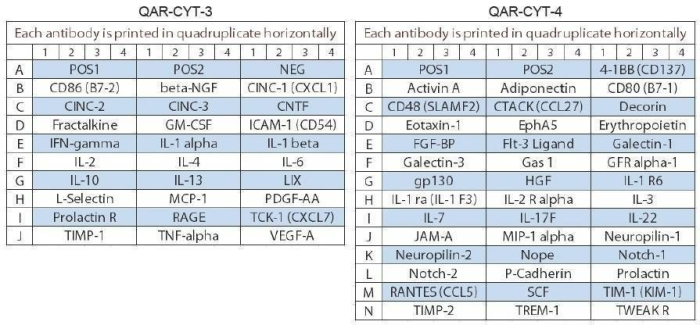G-Series Rat Cytokine Array 67 Kit. A combination of 2 non-overlapping arrays to measure the relative expression levels of 67 rat cytokines. Suitable for all liquid sample types.
Product Description
Specifications
| Size | 16 Sample Kit, 32 Sample Kit, 64 Sample Kit |
|---|---|
| Species | Rat |
| Quantitative/Semi-Quantitative | Semi-Quantitative |
| Number of Targets Detected | 67 |
| Compatible Sample Types | Cell Culture Supernatants, Plasma, Serum, Tissue Lysates, Cell Lysates |
| Solid Support | Glass Slide |
| Method Of Detection | Fluorescence Laser Scanner |
| Design Principle | Sandwich-based |
| Estimated Lead Time | 1-2 business days |
| Shipping Type | Blue ice |
| Storage | -20°C |

Amazon Gift Cards!
$5 Amazon gift card in every kit box purchased.
| Scroll over each target protein for more information | ||||
|---|---|---|---|---|
|
4-1BB
(TNFRSF9/CD137)
|
Activin A
|
Adiponectin
(ACRP30)
|
beta-NGF
|
CD48
(SLAMF2)
|
|
CD80
(B7-1)
|
CD86
(B7-2)
|
CINC-1
(CXCL1)
|
CINC-2
|
CINC-3
|
|
CNTF
|
CTACK
(CCL27)
|
Decorin
|
Eotaxin-1
(CCL11)
|
EphA5
|
|
Erythropoietin
|
FGF-BP
|
Flt-3 Ligand
|
Fractalkine
(CX3CL1)
|
Galectin-1
|
|
Galectin-3
|
Gas 1
|
GFR alpha-1
(GDNF R)
|
GM-CSF
|
gp130
|
|
HGF
|
ICAM-1
(CD54)
|
IFN-gamma
|
IL-1 alpha
(IL-1 F1)
|
IL-1 beta
(IL-1 F2)
|
|
IL-1 R6
(IL-1 Rrp2)
|
IL-1 Ra
(IL-1 F3)
|
IL-2
|
IL-2 R alpha
|
IL-3
|
|
IL-4
|
IL-6
|
IL-7
|
IL-10
|
IL-13
|
|
IL-17F
|
IL-22
|
JAM-A
(CD321/F11R)
|
LIX
|
L-Selectin
(CD62L)
|
|
MCP-1
(CCL2)
|
MIP-1 alpha
(CCL3)
|
Neuropilin-1
|
Neuropilin-2
|
Nope
|
|
Notch-1
|
Notch-2
|
P-Cadherin
|
PDGF-AA
|
Prolactin
|
|
Prolactin R
|
RAGE
|
RANTES
(CCL5)
|
SCF
|
TCK-1
(CXCL7)
|
|
TIM-1
(KIM-1)
|
TIMP-1
|
TIMP-2
|
TNF alpha
|
TREM-1
|
|
TWEAK R
(TNFRSF12)
|
VEGF-A
|
|||
Species Detected
Rat
Application Notes
Suggested Application
- Multiplexed Protein Detection
- Detection of Relative Protein Expression
- Detecting Patterns of Cytokine Expression
- Biomarker Screening
- Identifying Key Factors
- Confirming a Biological Process
Kit Components
- Antibody Array Slide(s)
- Blocking Buffer
- Wash Buffer 1
- Wash Buffer 2
- Lyophilized Standard Mix
- Biotinylated Detection Antibody Cocktails
- Streptavidin-Conjugated Fluor
- 30 ml Centrifuge Tube
- Adhesive Plastic Strips
- Manual
Other Materials Required
- Distilled or deionized water
- Small plastic boxes or containers
- Pipettors, pipette tips and other common lab consumables
- Orbital shaker or oscillating rocker
- Aluminum foil
- Gene microarray scanner or similar laser fluorescence scanner
View Compatible Laser Scanners
Don't have a compatible scanner? RayBiotech now offers FREE scanning service for all RayBio glass slide antibody arrays! Learn More
Protocol Outline
- Dry the glass slide
- Prepare Standards
- Block array surface
- Incubate with Samples and Standards
- Incubate with Biotinylated Detection Antibody Cocktail
- Incubate with Streptavidin-Conjugated Fluor
- Disassemble the glass slide
- Scan with a gene microarray laser scanner
- Perform densitometry and analysis
Storage/Stability
For best results, store the entire kit frozen at -20°C upon arrival. Stored frozen, the kit will be stable for at least 6 months which is the duration of the product warranty period. Once thawed, store array slide(s), standard mix, detection antibody cocktail, and Cy3-Conjugated Streptavidin at -20°C and all other reagents undiluted at 4°C for no more than 3 months.
Wang, Z., Niu, Y., Tian, X., Yu, N., Yin, X., Xing, Z., Wang, C. (2020). Switching On and Off Macrophages by a “Bridge?Burning†Coating Improves Bone?Implant Integration under Osteoporosis. Advanced Functional Materials, 2007408. doi:10.1002/adfm.202007408
Species:
Rat
Sample Type:
Conditioned media (Cell culture media)
Write Your Own Review
